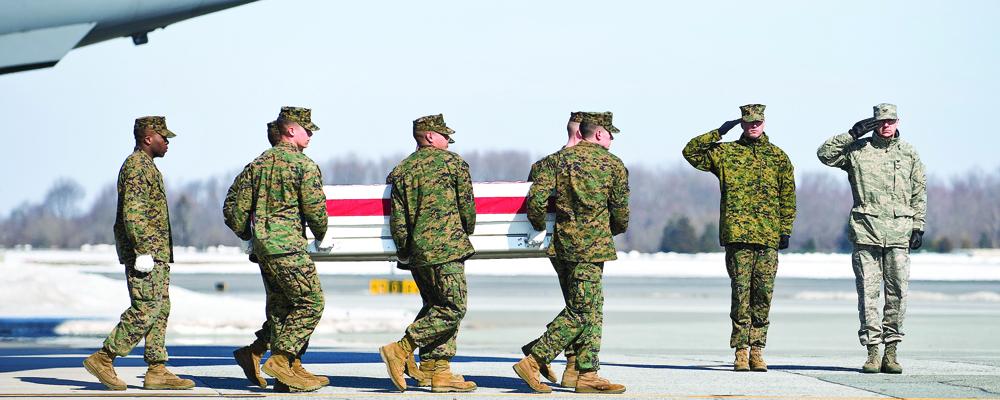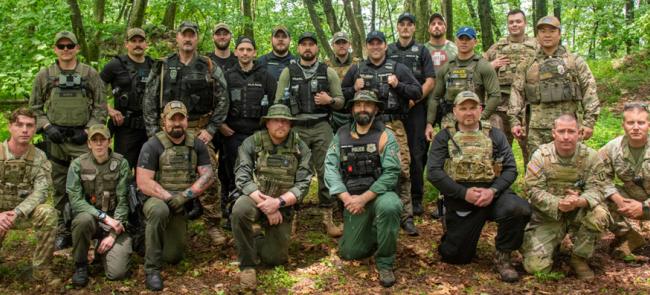
'How will I ever tell my family about days like today?'
A new book by a Guard PAO takes us behind the scenes
of his tours in Afghanistan and at Dover Air Force Base.
The tarmac at Dover Air Force Base, Delaware, is where fallen U.S. services members first come home to their families.
The dignified transfer of remains is not a ceremony; rather, it’s a solemn movement of remains in a flag-draped case from an aircraft to a waiting vehicle by a carry team composed of military personnel. Others in attendance are few. They include senior officers and occasionally civilians, experienced funeral directors and chaplains to comfort the families and public affairs officers and NCOs to escort the media if the family consents to coverage.
The process takes only a few moments, but the emotion for all involved can linger for a lifetime. Retired South Carolina Air National Guard Lt. Col. Les Carroll worked 99 dignified transfers during his four-month tour at the Air Force Mortuary Affairs Operations Center at Dover in 2009-2010.
In This Troubled Ground, the award-winning military and civilian journalist and acclaimed documentary filmmaker shares some of those experiences along with extraordinary events from his two deployments to Afghanistan. All three tours came late in his 28-year military career that concluded in 2013. They contribute to a novel based mostly on real events and people, but with a fictional story that any Gold Star family member could relate to.
 An excerpt from This Troubled Ground by Les Carroll follows.
An excerpt from This Troubled Ground by Les Carroll follows.
AFTER MY ORIGINAL DEPARTURE DATE, US Forces in Afghanistan had commenced a major offensive on a Taliban stronghold in Helmand Province. Our Department of Defense had actually announced the operation in the media, warned the townspeople to leave and warned the Taliban that a fight was coming. We took the fight to the Taliban with the support of several thousand Afghan National Army soldiers. But the Taliban fought back. Eight fallen US Marines arrived at Dover in the first week of the operation, including four on a sunny, windy Saturday afternoon a week before my eventual departure.
The marines hailed from Virginia, Indiana, Rhode Island, and Pennsylvania, and family and friends poured into the Dover area for the DTs, eventually totaling almost forty. I stood closer than normal because of the way I had positioned the family area and the media. It was a bright day, a rare daytime DT when we could easily see the faces of the family members. I could see the parents of one of the fallen marines, then the wife, parents, and sisters of another. Finally, the family and friends of the nineteen-year-old marine from Pennsylvania piled off the second bus. They had driven in several vehicles from Pennsylvania that morning. The moment they exited the bus and touched the tarmac, the group of male and female young adults could see the flag-draped cases on the aircraft. The crying started immediately, but it was a controlled cry—at first. We had briefed the order the cases would be carried down the aircraft ramp, so the families knew when the case carrying their loved one was in motion. The first case came off, a sergeant from Indiana. I saw his father’s arms wrap tighter around his mother and hold her closer. She sucked in her breath and remained composed, almost stoic. Somehow. The second case came off, and the sisters of the corporal broke down, just a sampling of what was to come.
Then the carry team lifted the case of the nineteen-year-old lance corporal from Pennsylvania and started the slow ceremonial march down the ramp of the C-17. The emotions from his family and friends. When the carry team reached the flat surface of the tarmac and passed in front of the official party, the emotional outburst reached a frantic crescendo, crying, howling, sobbing. I heard the deep voice of a man call out, but the chaos around the man distorted his words. Then the voice called out again, and this time I heard clearly, “Lucas, I love you son. You’re my hero. I love you.” I heard sniffling from my team of officers and NCOs standing behind me. I stood firm, but my knees knocked, and my upper body trembled beneath several layers of clothing, the emotion, the bright sunlight, the biting wind hammering away at my military bearing. What had started as a beautiful, chilly Saturday afternoon quickly escalated into the toughest day of my deployment, magnified by the extension of my tour. Now I understood why we were only tasked here for three months. I thought to myself, This is it. I have to go home now. I can’t do this any longer.
When the fourth case was loaded into the transfer vehicle, the exhausted visitors loaded back onto the buses. When they were gone, the media representatives and my public affairs team remained strangely quiet for the first minute, just going through the motions we had memorized. Needham pushed back tears. He looked like an NFL tight end, but he still struggled not to cry. I trembled inside, and with the family, carry team, and official party off the ramp, I thought maybe I would cry. We stood there for a few more seconds.
“That was tough,” I mumbled.
“Sure was,” Needham managed.
“It’s harder in the daylight,” I said. “You can see the family members. They’re not just hidden figures buried in the shadows. You hear them and see them.”
“You could see me too,” he said, “crying like a baby.” He lowered his head. “I’m sorry.” “For what? You think I haven’t cried out there? If you can stand through that without feeling like your knees are gonna buckle, then you’re not breathing.”
I nodded to the reporters and photographers, and they climbed back into the van. Back in the briefing room, the young marines from the carry team sat in the front row of seats. They were not eating pizza this time. Some were pushing back tears. Others looked stunned. They were clearly shaken. The Air Force chaplain stood close by, keeping watch. The Marine Corps lieutenant colonel who had just stood for all four dignified transfers, came walking into the briefing room. He passed me on the way to his men.
“That was a rough one,” I said, again.
“Sure was,” he said. “I’ll get them back to the barracks and give them a few days off, let them unwind.”
“Keep an eye on them,” the chaplain advised.
“I will,” said the lieutenant colonel.
There’s that iconic scene in Saving Private Ryan where Captain Miller diffuses a tense confrontation between his own men by unloading the close-kept details of his personal life before the war. “I’m a schoolteacher . . .” Just as his men were about to come unhinged from the stresses of war and death all around them, Captain Miller launches this memorable statement: “Sometimes I wonder if I’ve changed so much my wife is even going to recognize me whenever it is I get back to her, and how I’ll ever be able to tell her about days like today.” The fictional captain’s soothing speech played quietly in the back of my mind as I walked away from the passenger terminal that day. I had wondered many times during my past Afghanistan deployment, and many times standing on the ramp at Dover Air Force Base — how will I ever tell my family about days like today?
More information about the author and the book are available at https://lescarroll.com.



